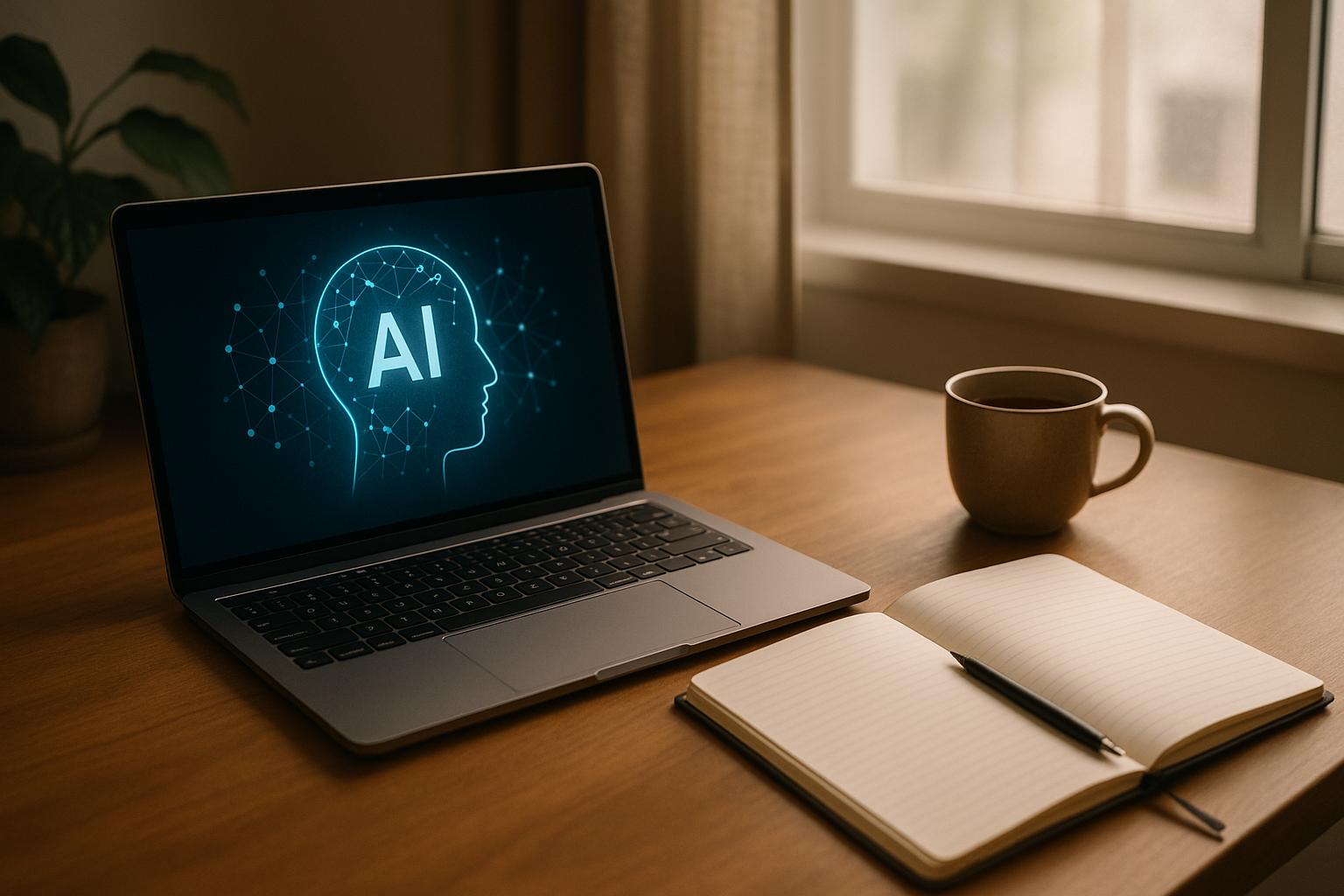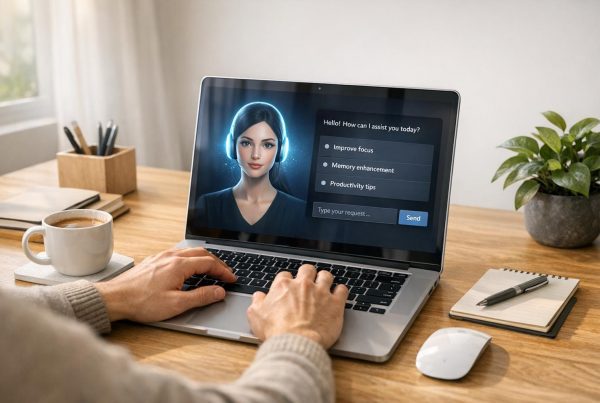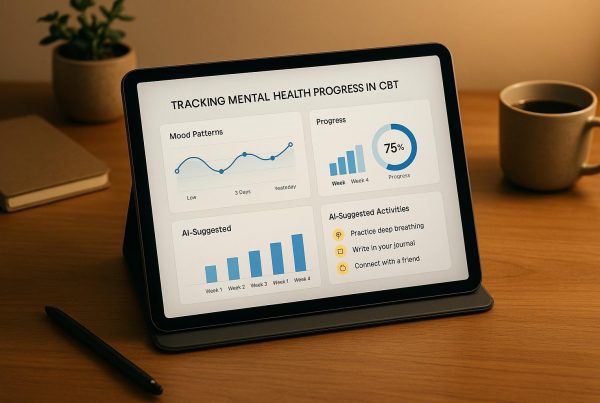AI coaching tools and human coaches each bring unique strengths to mental health support. Here’s a quick breakdown:
- AI Coaching: Affordable (around $15–$20/month), available 24/7, and scalable for large groups. AI excels at providing consistent, evidence-based techniques like CBT and tracking progress over time. However, it struggles with emotional depth and isn’t suitable for severe mental health issues or crises.
- Human Coaching: Offers deep emotional understanding, crisis management, and long-term relationship building. Human coaches can interpret subtle cues like tone or body language and adapt in complex situations. But sessions are costly ($100–$300 each) and limited to scheduled times.
Key Insight: Hybrid models combining AI’s accessibility with human expertise are emerging as a powerful solution, with studies showing high user engagement (80% over 12 months) and cost savings ($2,700 annually per member). These systems blend AI for routine support and human intervention for complex needs.
| Feature | AI Coaching | Human Coaching |
|---|---|---|
| Availability | 24/7 | Scheduled sessions |
| Cost | $15–$20/month | $100–$300/session |
| Emotional Connection | Limited | Strong |
| Crisis Management | Not suitable | Effective |
| Scalability | Unlimited users | Resource-intensive |
Conclusion: AI coaching is ideal for everyday support, while human coaching is critical for nuanced emotional care. Hybrid systems offer the best of both worlds, balancing affordability and depth of care.
Do Human Coaching and AI Coaching Need to Coexist?
Communication Methods: AI vs. Human Coaches
The way mental health support is delivered often hinges on the methods of communication. AI platforms and human coaches approach this in fundamentally different ways, each offering distinct strengths in how they interact with and respond to users.
AI Communication Methods
AI platforms like Aidx.ai use cutting-edge technology to deliver tailored, accessible mental health support. These systems rely on Adaptive Therapeutic Intelligence (ATI) Systems, which improve with every interaction. They learn how users communicate, what approaches resonate best, and what motivates them, creating a progressively personalized experience.
A standout feature is the voice-enabled interface, allowing users to engage in natural, spoken conversations. This means people can access support while walking, driving, or going about their daily routines, seamlessly integrating mental health care into their lives.
AI communication is grounded in evidence-based methodologies. Techniques from CBT (Cognitive Behavioral Therapy), DBT (Dialectical Behavior Therapy), ACT (Acceptance and Commitment Therapy), and NLP (Neuro-Linguistic Programming) are applied systematically. These frameworks ensure that every interaction follows proven therapeutic principles while adapting to individual preferences.
Another strength of AI is its ability to provide personalized insights. By tracking emotional states, confidence levels, stress patterns, and performance over time, these systems refine their responses, tailoring conversations to what works best for each person.
To maintain user engagement, AI platforms employ push notifications and email updates. This proactive approach ensures consistent support, reaching out when users might benefit most from encouragement or intervention.
Perhaps the most defining feature is real-time availability. Unlike traditional therapy schedules, AI support is accessible anytime – whether during a moment of crisis or when navigating daily challenges. This immediacy removes many of the barriers that often prevent people from seeking help.
While AI offers consistency and accessibility, human coaches bring a different, deeply personal approach to communication.
Human Communication Methods
Human coaches excel in their ability to connect through emotional intelligence and intuitive understanding. They can pick up on subtle nonverbal cues – a pause in someone’s voice, a shift in body language, or what’s left unsaid – all of which provide valuable context for understanding a person’s emotional state.
At the heart of human coaching is empathy and genuine connection. Coaches can validate emotions in ways that feel deeply personal, often sharing their own experiences when appropriate. This authentic connection fosters trust and creates a therapeutic relationship that many find essential for meaningful change.
Human coaches are also highly adaptable, demonstrating contextual flexibility. They can adjust their communication style on the spot, moving away from structured techniques when necessary. For example, they might shift to a conversational tone or focus on immediate crisis intervention if the situation calls for it.
Their clinical judgment and professional expertise enable them to navigate complex mental health scenarios. They can assess risks, recognize when a situation exceeds their expertise, and refer clients to other professionals when needed.
Another key strength is their ability to interpret nonverbal communication – things like facial expressions, tone of voice, and posture. These cues often reveal emotions or concerns that might not be expressed verbally, allowing coaches to respond with greater insight.
The concept of therapeutic presence – being fully present and attuned to the client – sets human coaches apart. This presence creates a safe and supportive environment where individuals feel truly heard, enabling them to explore sensitive or complex emotions.
Finally, human coaches excel at building long-term relationships. Over months or even years, they develop a deep understanding of their clients’ lives, not just through data points but through shared experiences and trust. This continuity provides a strong foundation for meaningful growth and transformation.
Strengths and Limitations: AI vs. Human Coaches
Understanding the strengths and weaknesses of AI-powered and human coaching is crucial for individuals and organizations looking to make thoughtful decisions about mental health support.
AI-based platforms like Aidx.ai shine in areas like consistency, accessibility, and scalability. They offer 24/7 support, eliminating the need to schedule appointments, and are highly affordable – costing just $15–$20 per month for unlimited access. In contrast, human coaching sessions often range from $100–$300 each. This affordability allows organizations to provide mental health benefits to a larger number of employees without breaking the bank.
Another standout feature of AI systems is their consistency. Unlike human coaches, whose responses can vary due to personal factors, AI delivers standardized, evidence-based techniques reliably. Aidx.ai, for instance, employs Adaptive Therapeutic Intelligence to learn user preferences and apply proven methods consistently.
That said, AI coaching has clear limitations. It’s designed for everyday mental health care and isn’t equipped to handle severe issues like major depression, psychosis, or suicidal ideation. For such conditions, licensed mental health professionals are essential [1].
Human coaches, on the other hand, excel in areas where AI falls short. They bring emotional intelligence and an ability to manage crises effectively. By picking up on subtle cues – like tone of voice or body language – they can interpret unspoken emotions and provide personalized, empathetic support. This depth of understanding allows human coaches to address discrepancies in communication and create a sense of genuine connection.
The relationship that develops between a client and a human coach is another critical advantage. Built on trust and mutual understanding, this bond enables coaches to challenge clients constructively and guide them through emotionally difficult situations.
When it comes to crisis situations, human coaches are indispensable. Whether it’s responding to a client expressing suicidal thoughts or managing a severe anxiety attack, they’re trained to provide immediate, nuanced support and can coordinate with emergency services if needed. However, human coaching has its own challenges: availability is often limited to scheduled sessions, and the high cost can make it inaccessible for many. Additionally, factors like fatigue or personal bias can sometimes lead to inconsistency.
Research highlights the strengths of both approaches. While 86% of people prefer human coaching for its emotional depth, AI systems boast high completion rates (90–93%) and strong engagement levels [3] [6] [9]. Interestingly, studies show that when users receive advice without knowing its source, AI-generated psychological advice can be perceived as just as empathetic and motivational as human advice [3]. Hybrid models that combine AI and human coaching are showing promise, too – one such program reported 80% engagement over 12 months and saved $2,700 per member annually in healthcare costs [9].
Comparison Table: Key Strengths and Limitations
| Dimension | AI Coaching | Human Coaching |
|---|---|---|
| Availability | 24/7 on-demand access | Limited to scheduled sessions |
| Cost | $15–$20/month for unlimited use | $100–$300+ per session |
| Scalability | Supports unlimited users | One-to-one, resource-intensive |
| Consistency | Standardized, evidence-based | Variable; depends on coach’s condition |
| Crisis Management | Not suitable for emergencies | Trained for crisis intervention |
| Emotional Depth | Limited nuance, improving over time | High emotional intelligence and intuition |
| Privacy | GDPR-compliant, encrypted | Professional confidentiality (with some risk of human error) |
| Personalization | Adaptive algorithms | Builds deep relationships over time |
| Complex Cases | Suited for everyday well-being | Essential for severe mental health issues |
| User Preference | 14% prefer AI; 86% prefer human | 86% prefer human coaching |
| Completion Rates | 90–93% retention in studies | Varies, often lower without tech support |
The data makes it clear that one size doesn’t fit all. AI coaching excels in providing accessible, consistent support for everyday mental health needs, while human coaching is irreplaceable for handling complex emotional challenges, crisis situations, and fostering the deep relationships needed for lasting change. Hybrid models, combining the strengths of both, are emerging as a powerful solution – using AI for routine support and check-ins, while reserving human expertise for more nuanced and strategic guidance.
sbb-itb-d5e73b4
Corporate Mental Health and Employee Support Applications
The way organizations approach mental health in the workplace has undergone a major shift. Companies now understand that employee wellbeing isn’t just a nice-to-have – it directly affects productivity, retention, and overall performance. As a result, both AI-driven platforms and human coaches are becoming integral parts of corporate mental health strategies. The key lies in how these two approaches can work together to create a more effective system.
AI’s Role in Expanding Access to Workplace Wellbeing
AI coaching platforms, such as Aidx.ai, are reshaping how organizations provide mental health support by making it more accessible and scalable. Unlike traditional employee assistance programs, which often reach only a small portion of the workforce, AI platforms can support an unlimited number of users simultaneously, all while keeping costs low.
These platforms offer a voice-enabled interface that’s available 24/7, making them particularly useful for global teams spread across multiple time zones. Privacy is another major focus, with features like GDPR compliance, end-to-end encryption, and incognito modes that automatically erase session data after 30 minutes of inactivity, ensuring confidentiality.
One standout feature is the executive dashboard, which aggregates anonymized data from regular employee check-ins. Metrics like stress levels, burnout risk, job satisfaction, and work-life balance scores are compiled to give managers a clearer picture of their team’s wellbeing. This allows leaders to make better-informed decisions about when and how to intervene, without compromising individual privacy.
Companies using AI coaching platforms have reported higher employee engagement and lower absenteeism. The scalability of these systems is another big advantage – one platform can provide tailored coaching to thousands of employees at once, adapting to each person’s communication style and needs. However, while AI is effective for handling routine issues, more complex situations often require the expertise of human coaches.
Human Coaches for Handling Complex Issues
AI is great for managing broad, everyday support, but when it comes to more intricate or sensitive challenges, human coaches are indispensable. Workplace issues like harassment, family crises, severe anxiety, or leadership conflicts require the emotional insight and clinical expertise that only trained professionals can provide.
Human coaches excel in areas where emotional intelligence and the ability to read subtle cues are essential. They can navigate complicated workplace dynamics, understand the nuances of organizational culture, and offer advice that balances individual needs with business objectives. In crisis situations, such as when an employee expresses thoughts of self-harm, human coaches can step in immediately and coordinate with emergency services if needed.
Their ability to build trust-based relationships is especially valuable in leadership development programs. Senior executives often rely on coaches as confidential advisors who challenge their thinking, offer strategic insights, and help them tackle complex organizational challenges. This kind of personalized feedback can lead to meaningful behavioral changes and better decision-making.
Another key strength of human coaches is their ability to step in when AI systems identify situations that go beyond their capabilities. AI platforms can flag potential issues early on, providing human coaches with valuable insights to ensure seamless and effective care. This collaboration ensures that employees get the right level of support at the right time.
Hybrid models are emerging as the most effective approach, combining the broad reach of AI with the specialized expertise of human coaches. In these systems, AI handles routine tasks like daily check-ins and goal tracking, while human coaches focus on more complex cases and strategic interventions. This mix not only keeps costs manageable but also ensures high-quality care. Hybrid programs have reported completion and retention rates of 90% to 93% [6].
In practice, these models work by having AI monitor employee wellbeing on a daily basis, flagging any signs of distress or situations that need a deeper level of care. Human coaches then step in to address these flagged cases, ensuring that their expertise is used where it’s most needed, while AI continues to manage the day-to-day support for the broader workforce. This balance creates a system that’s both efficient and highly effective.
Effectiveness and Future Outlook
The world of mental health coaching is changing quickly, with research shedding light on how both AI and human approaches perform in real-life scenarios. By analyzing these outcomes, we can better understand which methods work best in different contexts and how to shape the future of mental health support.
Current Outcomes and User Satisfaction
Studies indicate that AI-powered chatbots and coaching tools can effectively reduce mild to moderate symptoms of depression and anxiety in the short term, with results comparable to some human-delivered interventions[10][3]. However, for more complex or severe cases, the long-term effectiveness of these tools is still under examination. In such situations, human coaches are often preferred for their ability to build deeper, more nuanced therapeutic relationships[5][4].
Interestingly, user experiences with both AI and human coaches are generally positive. Research shows that the working alliance – a key measure of coaching effectiveness – can be equally strong with both AI and human coaches. Controlled studies reveal that participants form moderately high levels of working alliance with both models after just one session, with no significant differences between the two[7][4].
Trust plays a huge role in user satisfaction. When people believe they’re talking to a human, they often report higher levels of trust and empathy, even if the advice they receive is AI-generated[3][7]. In fact, some therapists have rated human-AI therapy transcripts as higher quality than those from human-only sessions, suggesting that AI can sometimes match or even exceed human conversational standards in certain settings[8].
Despite strong engagement with AI platforms, surveys show that 86% of users still prefer human coaching, largely due to the perception that AI lacks emotional depth[9]. These findings highlight the potential for hybrid models that combine the strengths of both approaches.
Emerging Hybrid Models
Hybrid systems that integrate AI and human coaching are gaining traction. These models aim to combine AI’s efficiency with the empathy and expertise of human professionals. A great example is Aidx.ai, which uses AI for routine tasks like check-ins, progress tracking, and immediate support, while reserving human coaches for more complex issues, crises, or deeper therapeutic needs. This setup ensures continuous, scalable support while keeping human expertise available for critical moments[5].
Here’s how it works: AI continuously monitors user well-being, providing evidence-based support through techniques like CBT, DBT, ACT, and NLP. The Adaptive Therapeutic Intelligence (ATI) System™ personalizes interactions by learning each user’s communication style and preferences. When situations arise that require human intervention – such as a crisis or a particularly complex emotional challenge – the system seamlessly connects the user with a qualified professional.
Early results from hybrid models are promising. For instance, a wellness program using a hybrid approach (HealthFleet) reported 80% user engagement at 12 months and $2,700 in annual healthcare savings per member[9]. Users appreciate the convenience and responsiveness of AI, paired with the reassurance of human involvement during critical moments[5].
These models are especially effective in workplaces, where AI can provide scalable support to entire teams while human coaches address high-priority cases identified through data analytics. This approach offers a cost-effective way to expand access to quality care without sacrificing personalized support.
Ethical Considerations and Challenges
As AI becomes more integrated into mental health support, ethical issues take center stage. Key challenges include protecting user data, preventing algorithmic bias, maintaining transparency about AI’s role, and building trust[3][5].
Data privacy is a top concern, given the sensitive nature of mental health information. Platforms like Aidx.ai address this with features like end-to-end encryption, GDPR compliance, and incognito modes that automatically clear session data after 30 minutes of inactivity.
Algorithmic bias is another critical issue. Poorly designed AI systems can introduce harmful biases or fail to account for cultural nuances in user communication, potentially leading to unsafe recommendations[2]. This highlights the importance of careful design and monitoring.
There’s also the risk of over-relying on AI for complex cases. Experts emphasize that human intervention is essential in these situations[3][5]. Stanford researchers warn that while AI can improve access, it might also lead to stigma or harmful advice if not properly regulated[2].
Other barriers include skepticism about AI’s empathy, regulatory uncertainties, and limited awareness of its capabilities[3][7]. Overcoming these hurdles will require transparent communication, rigorous safety protocols, and clear guidelines for when AI should defer to human professionals.
Looking ahead, the future of mental health support will likely revolve around more sophisticated hybrid models, where AI handles routine tasks and humans focus on complex, relational, or crisis interventions. Advances in natural language processing and emotional intelligence will enhance AI’s capabilities, while ethical frameworks and regulations will ensure safe, effective integration[7][5]. The challenge will be to balance AI’s scalability and consistency with the irreplaceable human touch in mental health care.
Conclusion: Choosing the Right Approach for Mental Health Support
When it comes to mental health support, the decision between AI and human coaching isn’t about picking one over the other – it’s about understanding what suits your unique needs and circumstances. Both options bring their own strengths to the table, and the most effective outcomes often come from knowing how and when to use each.
AI tools like Aidx.ai are perfect for immediate, accessible support in managing everyday challenges like stress, building habits, or improving performance. With its Adaptive Therapeutic Intelligence (ATI) System™, Aidx.ai tailors its guidance to your communication style, using proven techniques such as CBT, DBT, and ACT. Available 24/7 and equipped with a voice-enabled interface, it’s designed to step in when you need quick, evidence-based assistance. However, it’s important to note that while Aidx.ai is great for routine issues, it’s not built to handle severe mental health conditions. For those, professional human intervention is a must.
On the other hand, human coaches are irreplaceable when it comes to deeper emotional complexities. They excel in navigating crisis situations, reading subtle emotional cues, and fostering the kind of therapeutic relationships that lead to long-term change. Their clinical judgment and ability to adapt in real time make them essential for tackling serious mental health challenges.
As highlighted in this article, the best approach depends on your specific needs. If you’re looking for consistent, practical guidance, AI coaching can be a reliable companion. For more profound struggles, human expertise is indispensable. Interestingly, hybrid models that combine both AI and human coaching have shown exceptional results, achieving 80% engagement at 12 months and delivering $2,700 per member per year in healthcare cost savings [9]. By blending the strengths of both, individuals and organizations can create a well-rounded system for mental health support.
FAQs
How do hybrid AI and human coaching models enhance mental health support?
Hybrid models, such as those developed by Aidx.ai, are changing the way mental health support is delivered by combining the constant availability of AI with the nuanced expertise of human professionals. The AI component offers around-the-clock, tailored support, adjusting to your unique way of communicating and understanding your emotional state. This means you can receive immediate, consistent guidance whenever you need it most.
For situations requiring more specialized care, these models can effortlessly shift to human coaches or therapists. This thoughtful combination of technology and human insight provides a well-rounded approach, offering accessibility, customized support, and professional care. It’s a system designed to help individuals navigate their mental health journey with greater ease and better outcomes.
What are the limitations of AI coaching for mental health, and when should you consider human support?
AI coaching can be an effective tool for personal development and mental health support, especially when it comes to navigating everyday challenges, improving self-awareness, and building emotional resilience. Tools like Aidx.ai excel in these areas, offering guidance and support that can help users manage their day-to-day struggles. However, it’s important to recognize the boundaries of what AI can do. It is not equipped to address severe mental health conditions such as major depression, schizophrenia, or suicidal thoughts. These complex issues demand the expertise, empathy, and judgment of a licensed mental health professional.
If you or someone you care about is facing a crisis, experiencing intense emotional pain, or having harmful thoughts, reaching out to a qualified therapist, psychologist, or psychiatrist is crucial. While AI can provide valuable support alongside professional care, it should never replace the critical role of human intervention in these situations.
How do AI platforms protect sensitive mental health information?
Aidx.ai takes privacy and security seriously, employing encryption to protect all data both during transmission and while stored. The platform adheres to GDPR standards, ensuring your data is handled responsibly. Importantly, no human oversight occurs unless it’s mandated by law, offering users an extra layer of assurance. For those seeking even more privacy, Incognito Mode is available, automatically clearing session data after 30 minutes of inactivity. These measures work together to provide a secure and private experience for all users.



